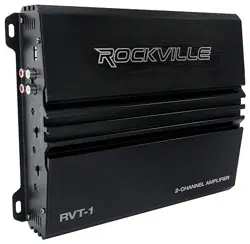Loading ...
Loading ...
Loading ...

6
Settings
Adjusting the System
1. Once the system is operational, set all crossover points to approximate settings. In the case of the basic subwoofer system, set the Low Pass lter crossover at 100Hz or so. Set the
bass equalizer controls to 0dB. Turn the controls using a small at-head screwdriver. Do not apply any pressure while turning as this might break the control unit.
2. Now set the amplier’s Input Sensitivity adjustment. The control(s) accessible on the side of the amplier marked LEVEL or INPUT LEVEL adjusts the input sensitivity. Turn it
counterclockwise to the MIN position. Adjust your head unit’s volume level to the maximum it can go before signal distorts or to the loudest level, which is usually about 75 – 85% on
most head units (you can also use an oscilloscope to see at what level your head unit distorts). When you begin to hear distortion in the sound, back down one notch and your amp is
set. It is helpful to have a second person to help you set the gain. When setting up a multi-amp system, set each amplier’s level controls separately. Start off with the bass amplier, then
adjust the highs amplier’s level control to match. Please note that the level control of any car amplier should not be mistaken for a volume control. It is a sophisticated device designed
to match the output level of your source unit to the input level of the amplier. Do not adjust the amplier level to maximum unless your input level requires it. Your system can also be
extremely sensitive to noise when the LEVEL is set to maximum and does not match your input signal. These adjustments need to be made only once when rst setting up the system.
3. Once you are satised with the level control settings, use any equalizer controls to adjust the system tonal level for personal preference. Keep in mind that after equalizing, you may
have to go back and reset the amplier’s level controls.
If your unit has been professionally installed, please do not change the gain settings set by the installer; he is the professional!
Audio Pre-amp Input
The RVA-M Series ampliers feature RCA pre-amp inputs. Run RCA cables from your sound source to the amplier inputs. We suggest you use high-quality, shielded RCA patch cords to help
reduce and eliminate unwanted electrical noise to your system. Use good quality RCA interconnect cables. Cheaper cables usually have poor shielding that can cause interference pickup.
Be sure to run the RCA cables on the side of the vehicle opposite the side used to carry the power and ground leads of the amplier.
Using the Built-In Low Pass Electronic Crossover
All RVA-M Series ampliers feature 12dB per octave fully adjustable crossovers with differential circuitry.
The knob marked LPF will control the low pass frequencies from 40Hz – 180Hz. A frequent error made is setting the low pass frequency too low, especially when using vented subwoofer
enclosures. We recommend that for most installations you set the frequency knob between 80Hz – 150Hz depending on your preference and the rest of your audio system.
Using the Subsonic Filter
Subsonic frequencies are very low and can cause damage to your subwoofers. The Subsonic Filter will allow you to attenuate any frequencies below the set limit.
Using the Phase Shift
The phase shift control synchronizes the phase of your subwoofer output to that of the other speakersinthe vehicle. It can be set anywhere between 0 to 180 degrees. Set the amp to
0 and listen to a track with some bass. Now set the control to 180 degrees, listen to the same track, and see if the bass output improves or becomes worse. Adjust the switch until you
ahcieve the best results.
Loading ...
Loading ...
Loading ...
